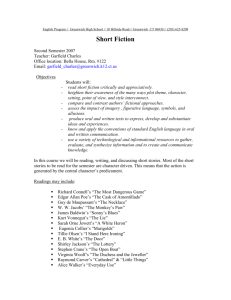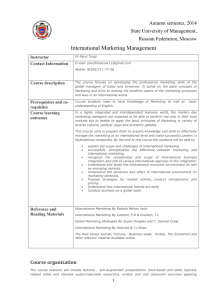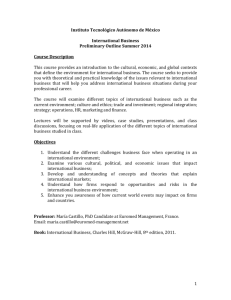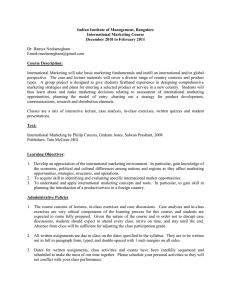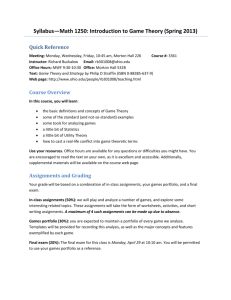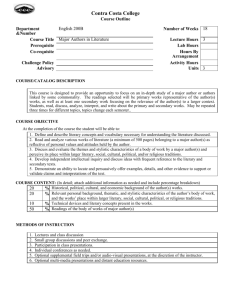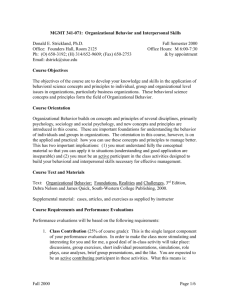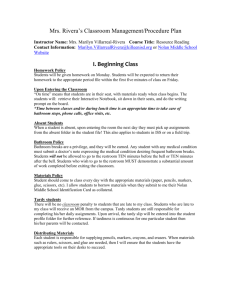English Program // Greenwich High School // 10 Hillside Road
advertisement
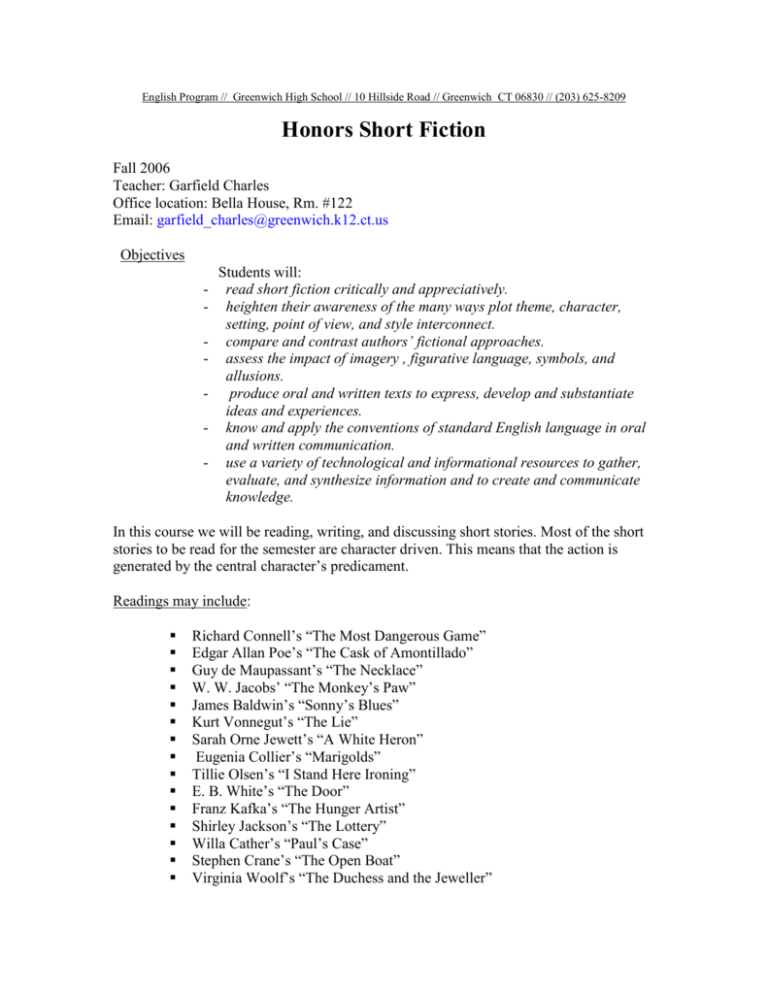
English Program // Greenwich High School // 10 Hillside Road // Greenwich CT 06830 // (203) 625-8209 Honors Short Fiction Fall 2006 Teacher: Garfield Charles Office location: Bella House, Rm. #122 Email: garfield_charles@greenwich.k12.ct.us Objectives - Students will: read short fiction critically and appreciatively. heighten their awareness of the many ways plot theme, character, setting, point of view, and style interconnect. compare and contrast authors’ fictional approaches. assess the impact of imagery , figurative language, symbols, and allusions. produce oral and written texts to express, develop and substantiate ideas and experiences. know and apply the conventions of standard English language in oral and written communication. use a variety of technological and informational resources to gather, evaluate, and synthesize information and to create and communicate knowledge. In this course we will be reading, writing, and discussing short stories. Most of the short stories to be read for the semester are character driven. This means that the action is generated by the central character’s predicament. Readings may include: Richard Connell’s “The Most Dangerous Game” Edgar Allan Poe’s “The Cask of Amontillado” Guy de Maupassant’s “The Necklace” W. W. Jacobs’ “The Monkey’s Paw” James Baldwin’s “Sonny’s Blues” Kurt Vonnegut’s “The Lie” Sarah Orne Jewett’s “A White Heron” Eugenia Collier’s “Marigolds” Tillie Olsen’s “I Stand Here Ironing” E. B. White’s “The Door” Franz Kafka’s “The Hunger Artist” Shirley Jackson’s “The Lottery” Willa Cather’s “Paul’s Case” Stephen Crane’s “The Open Boat” Virginia Woolf’s “The Duchess and the Jeweller” 2 Charlotte Perkins Gilman’s “The Yellow Wallpaper” Raymond Carver’s “Cathedral” Alice Walker’s “Everyday Use” Nathaniel Hawthorne’s “Young Goodman Brown” Irving Washington’s “Rip Van Winkle” Flannery O’Connor’s “The Life You Save May Be Your Own” Angelica Gibbs’ “The Test” Langston Hughes’ “Who’s Passing for Who?” Bernard Malamud’s “The Bill” Katherine Mansfield’s “The Fly” James Hurst’s “The Scarlet Ibis” Jack London’s “To Build a Fire” John Steinbeck’s “The Chrysanthemums” Additional literary works from the following writers may supplement the above list: Edith Wharton, Jean-Paul Sartre, Irwin Shaw, John Updike, Amy Bloom, Ralph Ellison, David Wong Louie, Nicholosa Mohr, Tess Gallagher, Kate Chopin, Joyce Carol Oates, Patricia Grace, and Nadine Gordimer. Grade Determination: In-class prompts and participation 15% Papers (Creative and Analytical) 45% Tests and Quizzes 10% Presentations (Projects/Performance) 15% Home Assignments 10% Journal 5% Course Policies and Expectations Attendance - Attendance is crucial to the success of the course especially because class sessions are designed as open forums to promote the sharing of ideas. Arrive promptly to classes. Coming into class late interrupts the flow of conversation and understanding. Please adhere to the school's attendance and tardy policies. One point will be deducted from your participation grade for every tardy incurred. 3 Participation - Participation in each class meeting is a necessary component of success in the course. As mentioned above, the course is designed as an academic forum-a place where students gather to discuss a piece of literature, where all opinions are valued, and where students learn from one another. All students are expected to attend class, focus their attention on the discussion, participate in group work, and contribute to the discussion. Late Assignments/ Projects Assignments/projects are due at the beginning of the class period. Any late paper/project --without prior approval- will lose a grade per day it is late. Assignments presented after 2 days will receive an F. If unforeseen circumstances prevent you from completing an assignment/paper/project on time, you are responsible for bringing a note signed by a parent/guardian that broadly states the circumstances. Note: All written requests for extensions will be kept on file for the year. Writing Assignments - In-Class Prompts - Prompts will be periodically put up on the board - for example, a brief passage from a short story or an observation about a character. Students will write an in-class response to the prompt for about 10 minutes. These in-class responses are designed to both to determine whether students have done the reading and to stimulate students to think analytically about the literary material. These in-class responses are allotted a √ +, √, or √- rating. Failing to do even one of them will compromise the grade allotted for participation. Students who are absent (excused) on the day of the in-class writing assignment will be responsible for making up the assignment. This response can be done at the Bella English Learning Center. You have TWO days from the date of your absence to make up any missed assignments/quiz/test. - Quizzes: These will be both announced and unannounced. General Paper Format - All creative/analytical papers should be TYPED and doublespaced. Use standard font styles (no larger than 12 point), Times New Roman, black ink and standard one-inch margins. Presentations: - Students (Cooperative groups of two - four) will present for a minimum of 10 minutes. Following the presentations, presenters must be prepared to respond to questions about their presentation topic. Grades for these presentations will be based on the following: relevance, thoroughness, poise and/or audience engagement, 4 demonstrated familiarity with subject matter, and use of audio/visual aids (technology). Creativity will be rewarded. Materials: - One subject spiral notebook (for use as your journal) Current reading material 100 lined note cards (for presentations) 1 pack ‘stickies’ ( Use these to take notes in your literary works) You are expected to have these materials with you every day. All class notes homework/paper assignments and handouts should be kept in a binder. General Information: Extra Help: Extra help is encouraged and will count positively toward your participation. I am available for extra help before and after school most days (At least one conference per quarter). I welcome the opportunity to meet with you and your parents at any time during the year. Please feel free to contact me to set up an appointment.
